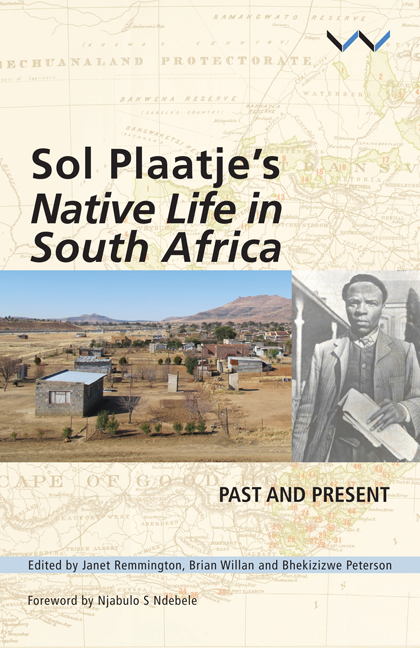Book contents
- Frontmatter
- Table of Contents
- Acknowledgements
- Foreword: Sol T Plaatje and the ‘power of all’
- Introduction: Native Life in South Africa – then and now
- Editions of Native Life in South Africa: 1916 to the present
- Looking Back: Foreword to Ravan Press edition of Native Life in South Africa, 1982
- Poetic Tributes
- What is in a name? In memory of Sol T Plaatje
- Segopoco Sa Moshui Sol T Plaatje
- In memory of the late Sol T Plaatje
- Lefatshe, nkometse
- Earth, swallow me
- Miscellaneous Frontmatter
- Chapter 1 Native Life in South Africa: Writing, publication, reception
- Chapter 2 Modernist at large: The aesthetics of Native Life in South Africa
- Chapter 3 The print world of the press and Native Life in South Africa
- Chapter 4 Going places: Native Life in South Africa and the politics of mobility
- Chapter 5 Native Life in South Africa and the world at war
- Chapter 6 African intellectual history, black cosmopolitanism and Native Life in South Africa
- Chapter 7 ‘Native Lives’ behind Native Life: Intellectual and political influences on the ANC and democratic South Africa
- Chapter 8 Whose past? Native Life in South Africa and historical writing
- Chapter 9 Women and society in Native Life in South Africa: Roles and ruptures
- Chapter 10 African progressivism, land and law: Re-reading Native Life in South Africa
- Chapter 11 Land and belonging: On the tomb ya ga Solomon Plaatje
- Chapter 12 Revisiting the landscapes of Native Life
- A Contemporary Reimagining: The Road to Dikhudung
- Contributors
- Plaatje Resources
- List of Figures
- Index
Chapter 8 - Whose past? Native Life in South Africa and historical writing
from Poetic Tributes
Published online by Cambridge University Press: 21 April 2018
- Frontmatter
- Table of Contents
- Acknowledgements
- Foreword: Sol T Plaatje and the ‘power of all’
- Introduction: Native Life in South Africa – then and now
- Editions of Native Life in South Africa: 1916 to the present
- Looking Back: Foreword to Ravan Press edition of Native Life in South Africa, 1982
- Poetic Tributes
- What is in a name? In memory of Sol T Plaatje
- Segopoco Sa Moshui Sol T Plaatje
- In memory of the late Sol T Plaatje
- Lefatshe, nkometse
- Earth, swallow me
- Miscellaneous Frontmatter
- Chapter 1 Native Life in South Africa: Writing, publication, reception
- Chapter 2 Modernist at large: The aesthetics of Native Life in South Africa
- Chapter 3 The print world of the press and Native Life in South Africa
- Chapter 4 Going places: Native Life in South Africa and the politics of mobility
- Chapter 5 Native Life in South Africa and the world at war
- Chapter 6 African intellectual history, black cosmopolitanism and Native Life in South Africa
- Chapter 7 ‘Native Lives’ behind Native Life: Intellectual and political influences on the ANC and democratic South Africa
- Chapter 8 Whose past? Native Life in South Africa and historical writing
- Chapter 9 Women and society in Native Life in South Africa: Roles and ruptures
- Chapter 10 African progressivism, land and law: Re-reading Native Life in South Africa
- Chapter 11 Land and belonging: On the tomb ya ga Solomon Plaatje
- Chapter 12 Revisiting the landscapes of Native Life
- A Contemporary Reimagining: The Road to Dikhudung
- Contributors
- Plaatje Resources
- List of Figures
- Index
Summary
Soon after it was published in London in 1916, Native Life in South Africa, Before and Since the European War and the Boer Rebellion appeared in further editions, in both London and New York. More than six decades later, in 1982, Ravan Press, a progressive publisher based in Johannesburg, produced the first South African edition, an inexpensive paperback, so allowing Native Life a much wider readership, especially in South Africa. When Ravan Press decided to bring out the new edition, its director asked the novelist Bessie Head, living in exile in Botswana, to write a Foreword. From what she wrote, one might gain the impression that Native Life was primarily a work of history. In his book, she said, Plaatje ‘unfolds the history of a mute and subdued black nation who had learned to call the white man “baas” ‘. She continued:
Native Life is wide and deep in its historical reach. A full portrait of the times emerges and we are presented with a view of history reaching back nearly five hundred years and up to a period of change and transition as it has affected the lives of black people.
Head ended her Foreword by commenting that ‘most black South Africans suffer from a very broken sense of history. Native Life provides an essential missing link.’
Before a consideration of Head's comments, let me provide some historiographical background. When I wrote a history of South African historiography in the mid-1980s, I wished to make the point that black Africans had written works of history that had been ignored by white professional historians. Native Life was one of the books I mentioned. The earliest of these works by black Africans, I suggested, was the Short History of the Native Tribes of South Africa written by Francis Peregrino, a recent immigrant to South Africa whose father came originally from West Africa. I then mentioned two works of which no copies survive. Alan Kirkland Soga, a contemporary of Plaatje's who also edited an African newspaper, Izwi Labantu, had written a large work of more than 500 pages entitled ‘The Problem of the Relations of Black and White in South Africa’, which seems to have been about to be published in 1906.
- Type
- Chapter
- Information
- Sol Plaatje's Native Life in South AfricaPast and Present, pp. 147 - 157Publisher: Wits University PressPrint publication year: 2016



